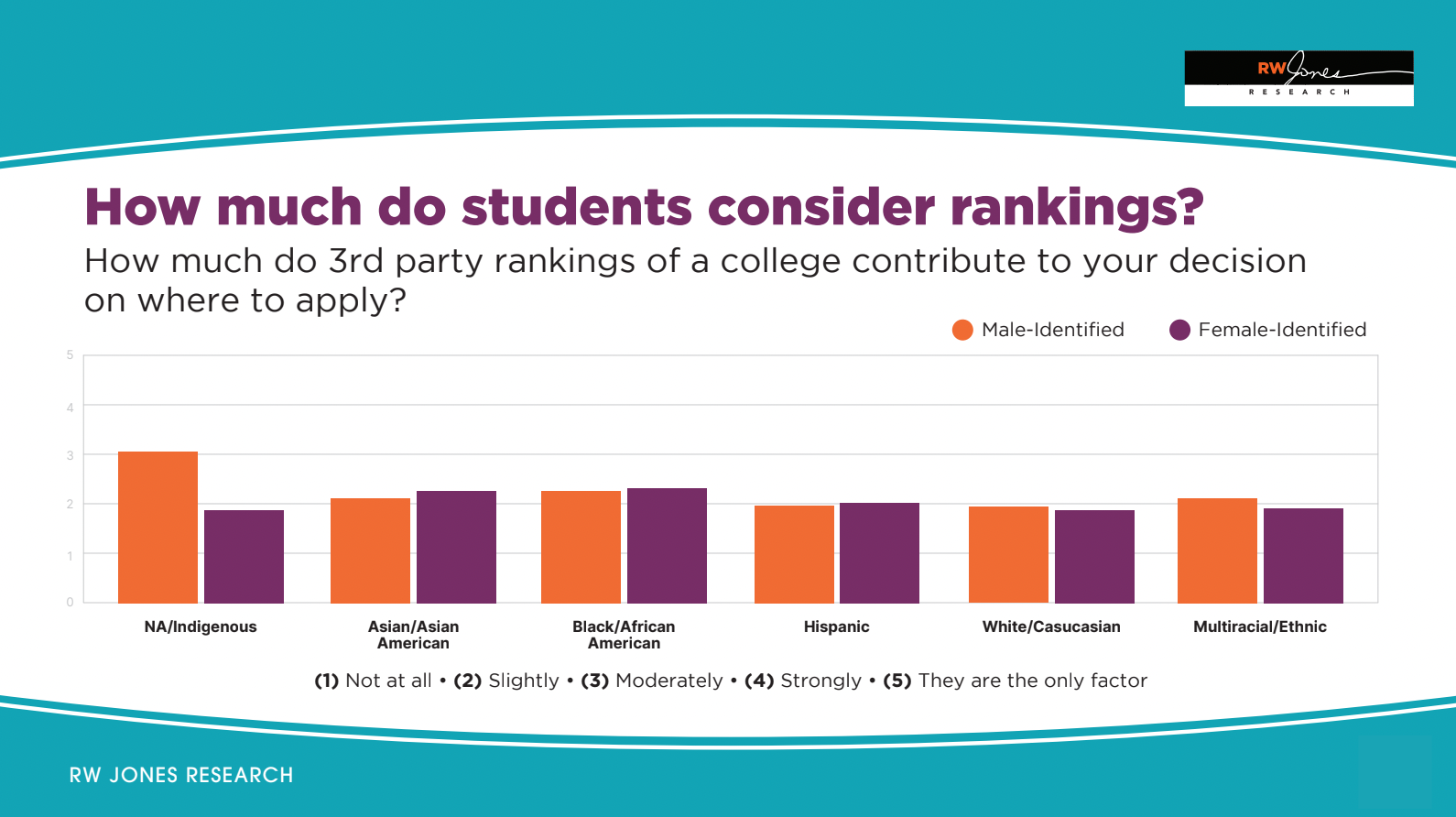
Survey: Yes, rankings matter — just not as much as you might think
RW Jones Research finds they aren't the most important consideration for students - or their parents - applying to colleges.
As U.S. schools weigh their participation in third-party college rankings, a new survey shows the published lists aren’t the most important consideration for applicants or their parents. It’s not even close.
In fact, both groups are more concerned with academic programs, the cost of attendance, campus safety and a few other factors during the college application and admission process, according to the study by RW Jones Research.
More than 1,000 prospective college students and parents completed the nationally representative survey, which asked participants to rate more than a dozen considerations — each on a 1-to-5 importance scale — that influence where the prospects will apply and enroll. The prospective students were between 16 and 18 years old; participants used an online platform to record their responses between May and June 2023.
"Rankings from outlets like U.S. News & World Report, the Princeton Review and the Wall Street Journal aren’t the deciding factor. But they are among several contributing factors when students determine where to apply and ultimately enroll," said Dr. Kevin Swartout, senior executive vice president at the RW Jones Agency. The national firm includes the eponymous research group.
For colleges and universities with limited resources and competing interests, the findings signal the importance of prioritization, Swartout said. His message to schools: It can be valuable to cultivate and promote rankings, just not at the expense of campus safety, degree program offerings or job placement rates.
"I wouldn't expect any institutions to intentionally prioritize rankings over those factors, but many do expend a good deal of time and resources to optimize their rank,” Swartout added. “It is important to contextualize the importance of rankings among other factors in the eyes of prospective students and their families."
"It is important to contextualize the importance of rankings among other factors in the eyes of prospective students and their families."
Research findings
RW Research undertook the study as popular rankings — in particular the well-known lists from U.S. News & World Report — face more scrutiny and some defections. The research group sought to establish the value of rankings and the extent to which they influence applicants. Among the specific findings:
- To prospective college students, about a half-dozen factors are more important than rankings as they choose where to apply and enroll. These include, in order from most to least important:
- academic programs, majors and whether they match the student’s interests;
- cost of attendance;
- campus safety;
- academic quality;
- ability to avoid debt;
- and job placement rates and preparation programs
- To parents of those prospective college students, all the above factors are more important than rankings — along with:
- geographic location and distance from home;
- local environment;
- and quality of amenities
- Rankings tend to be particularly important to those male-identifying prospective students who are American Indian, Native American and Indigenous. Overall, likely applicants of color generally put more stock in rankings than do likely white applicants. And parents of Asian American and Pacific Islander students, Black students and Hispanic students put more weight on rankings than do parents of white, Native American, and multiracial prospects.
- Prospective students see different third-party rankings in similar lights. Asked which ones are most important to their college application process, they most often described respective rankings from U.S. News & World Report, Niche, the Wall Street Journal, Princeton Review and the New York Times as “somewhat important” and “important.” Parents reported similar sentiments.
- Low-income and prospective first-generation students see the rankings as more significant than their higher-income and non-first-generation counterparts.
The RW Jones Research team is encouraging colleges and universities to reinforce distinctions that set them apart rather than try to appeal to every potential student. Other best practices include a data-driven approach to communications and marketing that centers those points of differentiation.
"These survey findings shouldn’t spell an end to participation in rankings, but they do underscore the need for thoughtful strategic planning," Swartout said.
